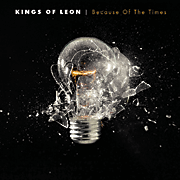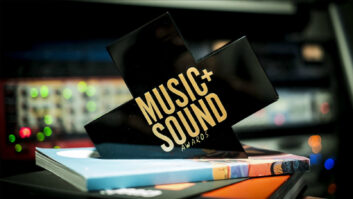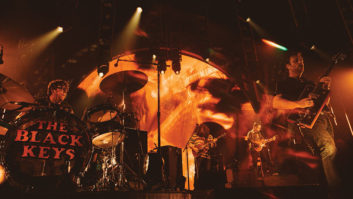

“We’re willing to take risks — playing it safe hasn’t done anything for us,” says Kings of Leon frontman/rhythm guitarist/lyricist Caleb Followill about his band’s third full-length album, Because of the Times. Working once again with co-producers Ethan Johns (who has subsequently produced projects with the reunited Crowded House, Joe Cocker and Turin Brakes) and their mentor, Angelo Petraglia, the band wanted “to really take it someplace new,” says Johns.
The result is a righteously old-school yet envelope-pushing album whose highlights include the irresistible seven-minute opener “Knocked Up,” with its hell-bent groove and defiantly yearning vocal; first single “On Call,” of which Johns notes, “It’s got that great little bass part, it’s relatively easy to swallow, but it’s still got bags of attitude”; and the blazing “My Party,” which stands as the analog equivalent to Trent Reznor at his most intense.
The three Followill brothers (Caleb; Jared, bass; and Nathan, drums), who grew up barnstorming the South with their Pentecostal preacher father, formed Kings of Leon in 2001 with their guitarist cousin, Matthew Followill, and were signed by RCA A&R man Steve Ralbovsky (The Strokes, My Morning Jacket, Ray LaMontagne), who decided to allow the youngsters, who then ranged in age from 14 to 21, to grow at their own pace. Ralbovsky put them together with producer Johns, who immediately recognized their potential.
“The noise they made together as a band was there right off the bat,” says Johns. “They were a stunning unit within two months. The level of commitment to mastering their instruments and putting their emotions into their playing — they were just complete naturals.”
Immediately after jelling as a unit, they recorded the Holy Roller Novocaine EP and set off for the UK, where they were readily embraced. Their first two albums, the 2003 Youth and Young Manhood and Aha Shake Heartbreak in 2005, became hits in Britain, but the group failed to make much of an impression back home, where the latter sold 182,000 copies — enough for the young band to be viewed as “promising” by critics, but hardly enough to meet present-day major-label criteria.
“So now it’s that challenging third album, and musically they’ve taken it further than anybody thought they were capable of five years ago,” says Ralbovsky, who shifted to cousin label Columbia last year. “Some of it stems from the musical inspiration of the people they’ve been around lately [the Kings have toured with U2, Pearl Jam and Bob Dylan, all of whom are fans], some of it’s their own instincts and they’ve gotten much more confidence and prowess as musicians, so they’re not afraid to stretch out a bit.”

Kings of Leon, from left: Jared Followill, Matthew Followill, Nathan Followill and Caleb Followill
Adds Johns, “The biggest thing that’s influenced the material on this album is the fact that they’d been writing a lot of it during soundchecks in arenas — big sound, the tempos are slower, things thematically are bigger.”
After making their first two albums in L.A., the Kings recorded back home in Nashville for the first time. They fell in love with Studio D at Blackbird, owned and run by John McBride. McBride is a self-described Beatles nut (hence the studio name); consequently, the facility is well-stocked with vintage gear, all of it thoroughly familiar to Johns, who grew up watching his legendary father, Glyn Johns, make now-classic records. The board in D was right up Johns’ alley: a Trident Series 80B with Neve Flying Faders.
“We walked in — it looked like a beautiful hotel,” Caleb Followill says of the studio. “Went in the room, opened the ceiling up; you could make the room whatever color you wanted with the lights for every mood, every vibe. We all knew we had written the record, and all we had to do was relax and let it come out. It was like no matter what had been goin’ on, we’d play a song two or three times, and it was like, ‘We got it!’”
At the very beginning, like a kid who stands up to dad for the first time, the Kings issued a challenge to Johns and Petraglia. As Caleb Followill recalls, “I said, ‘Look, we’re not the same band that made Youth and Young Manhood; Jared’s not 14 years old and I’m not 18 years old. We will never again be talked down to or treated like we’re not here to do our absolute best.’ And as opposed to being defensive, everyone was like, ‘Nice — I was hoping you would say that.’ Ethan got to sit back and relax, and we would go in there and we would just work it out. And we’d hear him on the talkback, saying, ‘All right, I think you’re ready. Let’s give it a go.’ We’d give it a go, and before you know it, we’d all be smiling.”
“Our style definitely departed from Ethan’s on this record,” says bass player Jared Followill. “We ended up meeting on this middle ground, which made it a great record, but [originally] we heard something huge — not produced in any way. I want people to hear what I hear when I’m onstage playing with these guys. And it ended up that Ethan knows a lot more about that stuff than anybody we’ve ever been around.”
“I apprenticed in the ’80s,” Johns confirms, “so I saw a lot of what you could do with the minutiae. I know how to use 12 microphones on a drum kit, as well as two — that sort of thing. The heyday of A&M Studios in the ’80s, where people would spend four days getting a bass drum sound — of course, we didn’t go that far, but [we had] that sort of attitude toward record-making.”

Jared Followill makes a bass-heavy statement on the band’s latest album, Because of the Times.
Johns used the modified Trident to track and mix. He recorded to a Studer 24-track aligned at +6 for 499 running at 30 ips, and mixed to a Studer 2-track. He went with Helios mic pre’s and Fairchild compression for the guitars, EMI mic pre’s for the drums and Universal Audio 610 pre’s for the bass mic (a Neumann U67) and the vocals. As on the band’s previous recordings, Caleb Followill sang into a Shure SM7 live during tracking.
A multi-instrumentalist who has played on just about every project up to now — drums, keyboards and guitars for the most part — Johns saw no need to do so on this album. “What I thought might be fun,” he says, “was to try and create keyboard sounds with outboard equipment. So a lot of the stuff you think is keyboards is actually stuff that I’ve taken from guitar parts and vocal parts and run through lots of equipment, and fiddled with, harmonized, filtered and just gone bananas with. That was really fun for me, getting into a different creative space, seeing what I could do with what was there.”
For these effects, which can be heard most vividly on the panoramic closer “Arizona,” Johns made use of a Cooper Time Cube, spring reverbs, chambers, a Yamaha REV 7, Eventide DSP4000 and AMS 1580 delays.

Caleb Followill sang into a Shure SM57.
The CD’s not-so-secret weapon is Jared Followill’s strikingly original bass playing, which is prominently featured in the mix. This is one band in which bass and drums are very much lead instruments — Jared Followill and drummer Nathan Followill make a glorious brotherly racket together, as hyperactive bass lines bounce off of pummeling snare and kick; it’s the rock ‘n’ roll equivalent of Muhammad Ali’s mantra to “float like a butterfly and sting like a bee.”
“On a lot of records, you can’t hear the bass at all, and the bass on this record is different,” says Jared Followill with obvious pride. “One song, I was like, ‘I just need a little bit more bass,’ and you could tell that Ethan was pissed, and he told the assistant, ‘All right, turn it up 1.5 dBs’ to teach us a lesson, ’cause it was obviously gonna be way too loud. And he did it, and everybody listened to it, and everybody was like, ‘Yep, it’s great — that’s it,’ and we kept it there.”
Johns, who describes Jared Followill as an “absolute monster” on his axe, acknowledges that pushing the bass beyond conventional levels paid off. “I don’t think bass is ever gonna be loud enough for Jared,” says the producer, “but if he’s happy with it, then he was definitely right. He’s a force to be reckoned with, but it’s great energy to have in the studio — it’s full-on. One of the most special things about them is their ability to allow a spiritual elevation to occur during a performance — getting something going and feeling it and creating that elation of spirit. That’s what I’m going for in a take with them; it’s when they hit that, that it all makes sense.”

LISTEN: Must Play
On Call
LISTEN: Must Play
Fans






